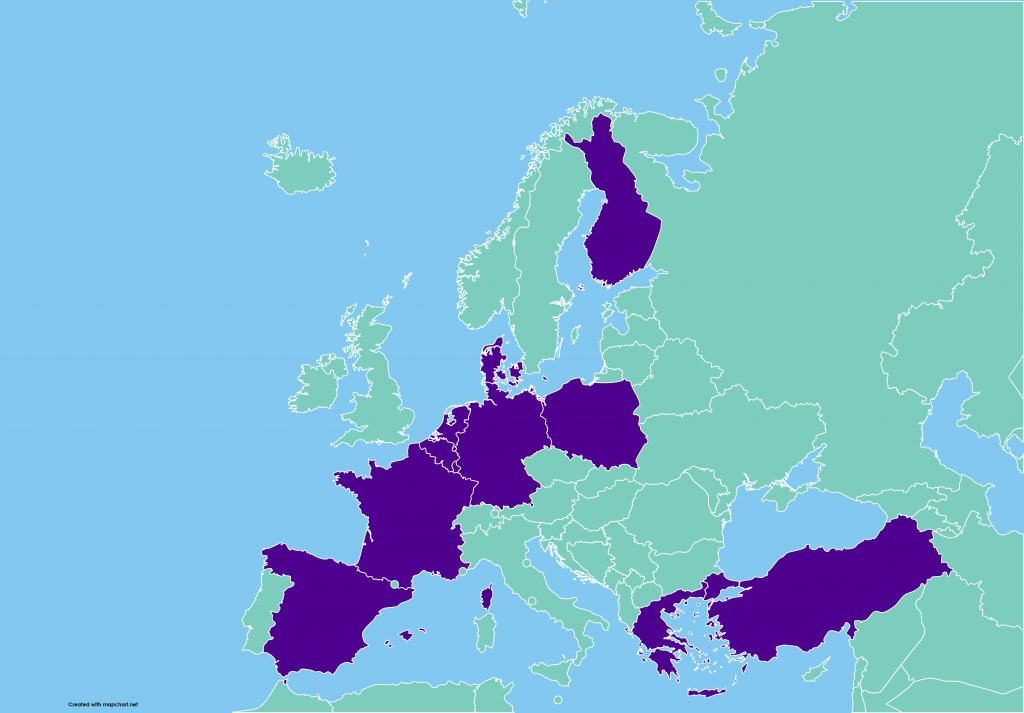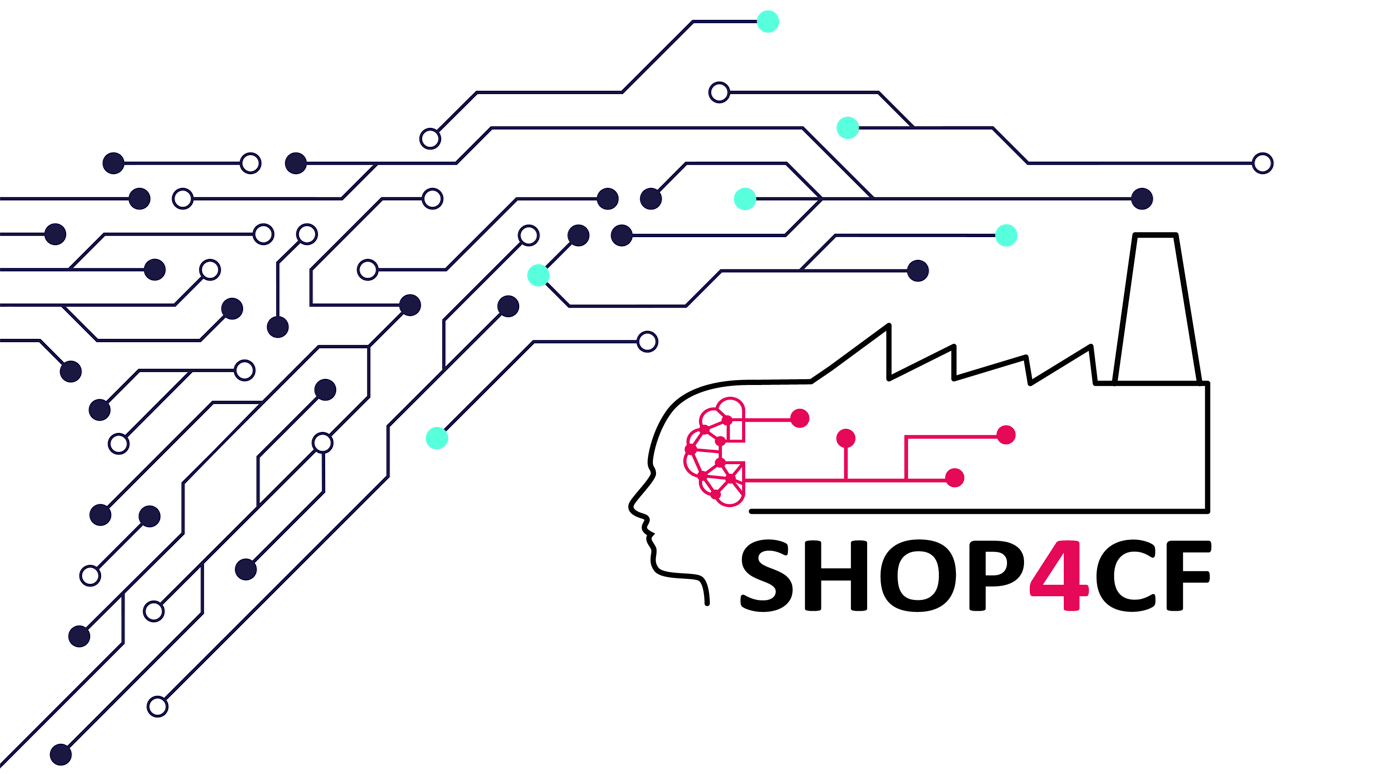Duration: 2020-2023
Programme: H2020-EU.2.1.1. – INDUSTRIAL LEADERSHIP – Leadership in enabling and industrial technologies – Information and Communication Technologies (ICT)
Topic: DT-ICT-07-2018-2019 – Digital Manufacturing Platforms for Connected Smart Factories
Link: Click here
Europe’s factories are getting smarter, optimizing production processes, and enabling a more sustainable and competitive industry. Finding the right balance between cost-effective automation and repetitive tasks and involving workers in areas such as adaptability, creativity, and agility is the ultimate aim. In accordance with the highly connected factory model, a lot of data is being generated within the factory – by the embedded sensors and connected production equipment. All this information is useful in improving processes.
SHOP4CF aims to find the right balance between cost-effective automation and repetitive tasks, and involve human workers in areas such as adaptability, creativity and agility where they create the biggest added value. This is achieved by relying on the following:
Objectives
-
- A platform developed on an open architecture encompassing technologies based on RAMI 4.0 and FIWARE Technologies which can support humans in production activities and provide basic implementation as a free, open-source solution. Including 30 components developed within the SHOP4CF project by top RTOs from all over Europe
- Implementing pilots acting as the testing facilities and seeds for the adoption of the platform. 4 large-scale pilots led by industry leaders in Europe and 30 FSTP Pilots selected through 5 competitive open calls will receive technical, business and access to investment support.
- A marketplace as a one-stop-shop for SMEs (developers and end users) to access essential services for digital transformation including business modelling, technical support, access to skills and finance.
- Building a vibrant and growing community around the platform necessary to create the adoption critical mass
- Leading pre-standardization activities in the areas of collaborative robotics, AGVs and use of IoT devices on the shop floor.
Impact:
- SHOP4CF will demonstrate that public-funded research can help SMEs & Mid-Caps achieve digital excellence and global competitiveness through adopting advanced robotics solutions in human-centric digitalization.
- SHOP4CF creates a technological platform offering easy-to-access (for SMEs and mid-caps) components from the areas of IoT, robotics, Big Data, AI etc.
- SHOP4CF also builds a community of experts capable of developing new components according to the market pull as well as designing and deploying complete solutions based on the platform. Thus, it makes custom-tailored, human-oriented digitalization much more accessible to the industry.
Role of FAST-Lab.
- FAST-Lab. participation is distributed along different WPs of the project. The major contribution of TAU is on development of different software components and services including multi-modal programming solutions, virtual reality-based solutions for training and monitoring, data collection framework, digital twin, and adaptive interfaces.
- The component developments entail contributing to the design, assessment and evaluation of solutions and tools. Additionally, FAST-Lab. contributes to the integration of the developed components in the project’s pilot use cases while also coordinating the technical management of two project use cases.
- FAST-Lab. also leads the scientific dissemination activities of the project to share early, mid and late stages results of the project within the research community.
- FAST-Lab. also contributes to other project dissemination and exploitation plans of the project amongst other contributions.

Coordinator: TECHNISCHE UNIVERSITAET MUENCHEN; Germany
Participant Organizations:
- TAMPEREEN KORKEAKOULUSAATIO SR: FAST-Lab.
- TEKNOLOGIAN TUTKIMUSKESKUS VTT OY: FINLAND
- SIEMENS AKTIENGESELLSCHAFT: GERMANY
- FZI FORSCHUNGSZENTRUM INFORMATIK: GERMANY
- FRAUNHOFER GESELLSCHAFT ZUR FORDERUNG DER ANGEWANDTEN FORSCHUNG EV: GERMANY
- UNIWERSYTET OPOLSKI: POLAND
- VOLKSWAGEN POZNAN SP Z O.O.: POLAND
- INSTYTUT CHEMII BIOORGANICZNEJ POLSKIEJ AKADEMII NAUK: POLAND
- ARCELIK A.S.: TURKIYE
- EUROPEAN DYNAMICS LUXEMBOURG SA: LUXEMBOURG
- ROBERT BOSCH ESPANA FABRICA MADRID SA: SPAIN
- FUNDACION TECNALIA RESEARCH & INNOVATION: SPAIN
- UNIVERSIDAD POLITECNICA DE MADRID: SPAIN
- DIGITALENT GROUP SL: SPAIN
- INTERUNIVERSITAIR MICRO-ELECTRONICA CENTRUM: BELGIUM
- TECHNISCHE UNIVERSITEIT EINDHOVEN: NETHERLANDS
- INSTITUT DE RECHERCHE TECHNOLOGIQUE JULES VERNE: FRANCE
- FUNDINGBOX RESEARCH APS: DENMARK
- TEKNOLOGISK INSTITUT: DENMARK
- ROBERT BOSCH ESPANA SLU: SPAIN (3RD PARTY)
- FUNDINGBOX COMMUNITIES SL: SPAIN (3RD PARTY)
- EUROPEAN DYNAMICS ADVANCED INFORMATION TECHNOLOGY AND TELECOMMUNICATION SYSTEMS SA: GREECE (3RD PARTY)

This project has received funding from the European Union’s Horizon 2020 research and innovation programme under grant agreement No 873087. Neither the European Commission (EC) nor any person acting on behalf of the Commission is responsible for how the following information is used. The views expressed in this publication are the sole responsibility of the authors and do not necessarily reflect the views of the EC.

